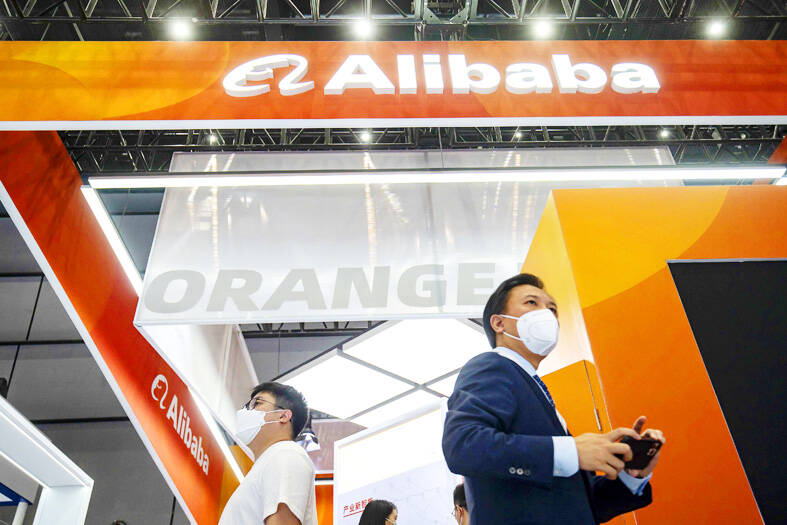Alibaba Group Holding Ltd (阿里巴巴) plans to split its US$220 billion empire into six main units that would individually raise funds and explore initial public offerings (IPOs), in the biggest overhaul of China’s e-commerce leader since its inception more than two decades earlier.
The move frees up the Chinese company’s main divisions from e-commerce and media to the cloud to operate with far more autonomy, laying the foundation for spin-offs and market debuts. Its shares climbed more than 4 percent in premarket trading in New York.
The shift to a holding company structure is rare for major Chinese tech companies. It marks a departure from the Internet company’s traditional preference for keeping most of its operations under one roof, running everything from supermarkets to datacenters under the main Alibaba umbrella.

Photo: Bloomberg
It is also a strong signal that Alibaba is ready to tap investors and public markets, after Chinese President Xi Jinping’s (習近平) administration’s clampdown on Internet spheres wiped out more than US$500 billion of its value.
“The news follows Beijing’s vow to support private sector. If China wants to achieve its 5 percent GDP growth target, they need to support companies like Alibaba,” said Steven Leung (梁偉源), executive director at UOB Kay Hian Ltd (大華繼顯控股) in Hong Kong.
Alibaba’s announcement yesterday coincided with the return of its billionaire cofounder Jack Ma (馬雲) to China after more than a year abroad.
Group chief executive officer Daniel Zhang (張勇) is to head up the cloud intelligence division, a nod to the growing role that artificial intelligence would play in the e-commerce leader’s portfolio in the long run.
Former international retail chief Jiang Fan (蔣凡) is to head up the digital business unit, while longtime executive Trudy Dai (戴珊) takes up the main Taobao Tmall (淘寶天貓) online shopping division. Its other divisions include local services such as meal delivery, the Cainiao (菜鳥) logistics group and digital media and entertainment.
Despite the creation of a half-dozen business lines, Alibaba yesterday reaffirmed the cost-cutting it had pledged to shore up the bottom line.
That was a conservative shift for a tech conglomerate that once spent aggressively to dominate swaths of the economy, reflecting the dissipation of growth since Xi’s crackdown ensued in 2020.
Beijing has cracked down on the country’s tech giants over the past two years, forcing fundamental changes in the business models of companies including Alibaba.
The e-commerce pioneer is also navigating increasingly tough competition from archrival JD.com Inc (京東), as well as up-and-comers such as PDD Holdings Inc (拼多多) and ByteDance Ltd (字節跳動).
“At 24 years of age, Alibaba is welcoming a new opportunity for growth,” Zhang said in a statement. “The market is the best litmus test, and each business group and company can pursue independent fundraising and IPOs when they are ready.”

Intel Corp chief executive officer Lip-Bu Tan (陳立武) is expected to meet with Taiwanese suppliers next month in conjunction with the opening of the Computex Taipei trade show, supply chain sources said on Monday. The visit, the first for Tan to Taiwan since assuming his new post last month, would be aimed at enhancing Intel’s ties with suppliers in Taiwan as he attempts to help turn around the struggling US chipmaker, the sources said. Tan is to hold a banquet to celebrate Intel’s 40-year presence in Taiwan before Computex opens on May 20 and invite dozens of Taiwanese suppliers to exchange views

Application-specific integrated circuit designer Faraday Technology Corp (智原) yesterday said that although revenue this quarter would decline 30 percent from last quarter, it retained its full-year forecast of revenue growth of 100 percent. The company attributed the quarterly drop to a slowdown in customers’ production of chips using Faraday’s advanced packaging technology. The company is still confident about its revenue growth this year, given its strong “design-win” — or the projects it won to help customers design their chips, Faraday president Steve Wang (王國雍) told an online earnings conference. “The design-win this year is better than we expected. We believe we will win

Chizuko Kimura has become the first female sushi chef in the world to win a Michelin star, fulfilling a promise she made to her dying husband to continue his legacy. The 54-year-old Japanese chef regained the Michelin star her late husband, Shunei Kimura, won three years ago for their Sushi Shunei restaurant in Paris. For Shunei Kimura, the star was a dream come true. However, the joy was short-lived. He died from cancer just three months later in June 2022. He was 65. The following year, the restaurant in the heart of Montmartre lost its star rating. Chizuko Kimura insisted that the new star is still down

While China’s leaders use their economic and political might to fight US President Donald Trump’s trade war “to the end,” its army of social media soldiers are embarking on a more humorous campaign online. Trump’s tariff blitz has seen Washington and Beijing impose eye-watering duties on imports from the other, fanning a standoff between the economic superpowers that has sparked global recession fears and sent markets into a tailspin. Trump says his policy is a response to years of being “ripped off” by other countries and aims to bring manufacturing to the US, forcing companies to employ US workers. However, China’s online warriors